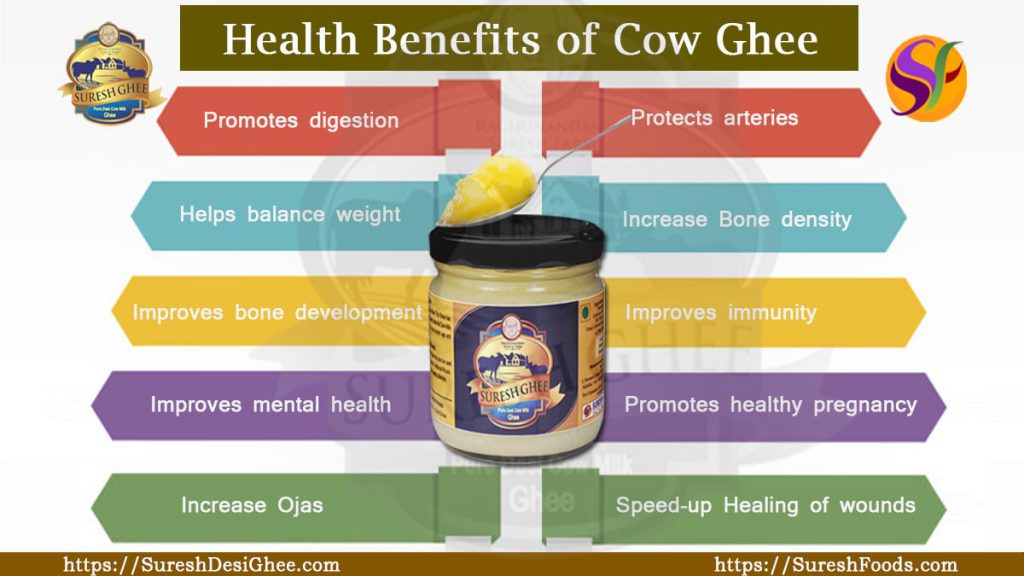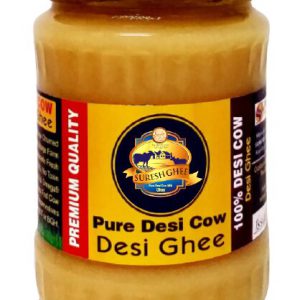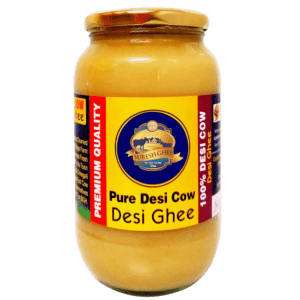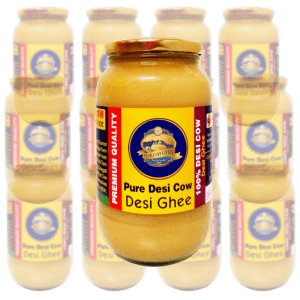Pure A2 Cow Ghee is not just used in cooking but also acts as medicine. It is often used as a nourishing oil for massage. According to ancient Ayurveda, cow ghee is full of essential nutrients, fatty acids, antibacterial, antifungal, antioxidant and antiviral properties. This is quite full of sweet and saturated fat. You can add 2 teaspoons to your baked dishes during lunch or dinner, or you can use it in cooking.
Nutritional uses of cow ghee
1. Saturated fats:
Cow ghee contains saturated fats. It’s the next heating point as compared to vegetable oils that contain polyunsaturated fats. Hence, the saturated bonds in cow ghee don’t break down into radicals during heating.
Cow ghee helps in enhancing digestion by stimulating the secretion of stomach acid. It is also rich in butanoic acid that helps lower inflammation, which aids in the efficient digestion of food.
3. Rich in antioxidants:
Cow ghee is usually sourced from grass-fed cows, therefore, it’s a decent presence of K2, butanoic acid, and Conjugated polyunsaturated fatty acid (CLA). CLA could be a natural carboxylic acid that has anticancer and antioxidant properties that help in digestion, strengthen the system, and additionally help in weight loss.
4. Balances VATA, PITTA & KAPHA within the body:
Ayurveda suggests, cow ghee is one of the rare supplements that helps in balancing Vata & Pitta within the body, which helps hamper ageing. Additionally, it increases Kapha.
5. Heals and nourishes the body:
Cow ghee is additionally known for its healing properties, especially for skin burns and sunburns. Our elders have always recommended the usage of cow ghee on hair because it provides relief from dryness and flaky scalp.
As winter approaches, it’s advisable to replenish cow ghee for skincare. It’s the simplest skin moisturizer, and it also heals cracked lips & heels.
6. Relieves constipation:
It has been observed that many people encounter problems with digestion and constipation. Except for a high-fibre intake, they’re advised to consume a teaspoon-full of cow ghee with warm milk nightly to assist effective digestion and keep constipation trapped. Follow the diet plan to keep away constipation (kabj).
7. Non-allergic:
Cow ghee doesn’t contain milk solids because it could be drawn from butter. It’s also very low in lactose and casein content. Hence, it may be safely consumed by those plagued by milk intolerance.
8. Contains Beta Carotene
Ghee consists of rich amounts of antioxidants. Butyrate and Beta-carotene are some of the antioxidants present in ghee which support in dodging the harmful effects of free radicals on a person’s body and inhibit multiple chronic issues. Individuals going through prediabetes or diabetes possess a tremendous backup of vitamins and nutrients from consuming ghee. Ghee contains multiple vitamins like vitamins A, E, D, K, and beta-carotene which are found to be effective for various body functions.
9. Manages Heart Health
The linoleic acid present in ghee works efficiently enough to combat heart problems. In many circumstances, people going through diabetes are at more risk of developing cardiac disorders. Intake of ghee may be a great component for decreasing the likelihood of heart issues. Furthermore, ghee supports in minimizing the susceptibility to heart failures, heart attacks, blockages, and strokes. The presence of omega-3 fats in ghee support to combat such issues.
Moreover, ghee consists of monounsaturated fats that support in keeping the heart away from diseases and sustaining good health. Consuming the organic forms of ghee supports in sustaining the low cholesterol levels which might maintain cardiovascular health by resisting LDL cholesterol. Individuals must consume the amounts of ghee for gaining all such benefits.
10. Enhances Insulin Levels
The development of the fatty deposits in the body starts to melt down when the optimum amount of ghee is consumed which results in efficient diabetes management. Such function allows better secretion of insulin, and this indeed supports in combating diabetes.
The consistency of ghee does not have insulin. Insulin itself is a hormone which is secreted from the beta cells of the pancreas within a human body. Even though the consumption of ghee does not need the intake of insulin as it does not possess carbs. Although ghee can be fatty, a person with diabetes with a record of cholesterol may require insulin but might have to look after ghee consumption with consultation.
For health-conscious people, the nutritional value of cow ghee is unbeatable, because it could be a healthier alternative to butter and oils. Cow ghee has healthy fat and will definitely be added to your daily diet but in limited quantities.
What is Pure Ghee?
Pure Desi Ghee refers to the ghee made by the traditional method. Broadly, there are 2 methods of making ghee one is from Curd Route and Another is from Creme/Malai.
Desi cow milk ghee prepared with traditional Vedic – bilona churned method is real desi ghee. In the bilona churn method, the whole curds are churned with a wooden churner.
First, the milk is obtained from grass-fed desi cow’s where only 70% of milk is used for making ghee, rest 30% is left for Calf. Then the milk is boiled in earthen pots. Boiled pure desi cow’s milk is overnight converted to yoghurt in an earthen pot.
Yoghurt is churned using a wooden churner. Butter is so obtained is warmed to get the desi cow’s milk ghee. The process of creating traditionally clarified butter is complete once the water is evaporated and the fat (clarified butter) is separated from the milk solids.
In this process, around 27-28 Kg of milk is used to make just 1 KG of ghee! It has all the properties as described in the Vedas and Ayurvedic Shastras. It is the essence of milk, rather than heating the cream obtained directly from milk. Ghee obtained from this process is called PURE GHEE.
In another method (butter/cream oil) Ghee is prepared by simmering butter, which is churned from cream, skimming any impurities from the surface, and then pouring and retaining the clear, still liquid fat, while discarding the solid residue that settles on the bottom. Spices can be added for flavour. The texture, colour, and taste of ghee depend on the quality of the butter, the source of the milk used in the process and the duration of the boiling.
Pure Desi Ghee and Ayurveda Perspective
According to its roots in ancient Ayurveda, cow ghee is full of essential nutrients, fatty acids, and antibacterial, antifungal, antioxidant and antiviral properties. This is full of sweet and saturated fat. You can add 2 teaspoons to your baked dishes during lunch or dinner, or you can use it in cooking. If cow ghee is very old so it is more effective and more expensive.

Buy Cow Ghee Online : Order Now. Free Shipping
Desi Cow Ghee is one of the most popular Ayurvedic food which has magnificent healing properties. Ghee is one of those food items which has strong relevance to our lives as it is not just a part of our traditional cuisine but is also strongly recommended by Ayurveda due to its medicinal properties.
Cow ghee is full of antioxidants and is also antibacterial and anti-fungal in nature. Loaded with important nutrients and fatty acids, ghee is also considered a superfood. Cow ghee is believed to be most beneficial when consumed with milk. Sounds weird? But it’s true. In ancient times, milk with ghee was a part of not just the diets recommended by Ayurvedic physicians but was also what the kings and warriors consumed for bodily strength.

Cow Ghee Health Benefits and Uses
- Good for cooking
- It helps to improve digestion and curing constipation. It stimulates digestive system
- It has the power to stop growing cancer cells.
- Helps to improve voice.
- Increase sexual power and sperm count.
- Strengthen immune system
- Increase hunger
- Improve vision of eyes
- Increases body stamina
- Helps skin to glow
- Increase appetite
- Helps to cure thyroid disease
- It heals wounds, chapped lips and mouth ulcer
- Detoxifies body
- Whole body massage with cow ghee boost the immune system
- Helps to cure insomnia
- It lubricate joints
- Helps to heal burn skin
- It mobilize the stubborn fat area and reduces it
- It reduces bad cholesterol and increases metabolism
- Cure hair fall
- Good for healthy heart
- People who are suffering from piles, fissure and fistula problems, cow milk ghee is recommended for them. They can apply cow milk ghee externally for relieving pain and burning sensation.
- A warm glass of cow milk mixed with a spoon of cow ghee before going to bed will increase your digestion and will clear stomach in the morning.
- It is very good for improving memory power and intelligence, it is known as brain tonic. It strengthens mental strength.
- It can help to cure bleeding nose, sinus headaches, migraine problem and brain stroke. Just drop a few drops of warm cow ghee in the nostrils for few days
- It specifically helps to reduce stubborn fat. One can add 1-2 teaspoon of cow ghee in his regular diet. But excess consumption of ghee can increase your weight.
- Adding ghee in your regular diet also softening stool and cure constipation.
Cow milk ghee Precautions:
- It should be pure
- Excess consumption may increase weight
- First check with the Doctor, weather ghee suits to their body or not
- Regular exercise and physical activity is important for those who consume cow milk, ghee, else it will increase weight.






 WhatsApp us
WhatsApp us
Naveen m...